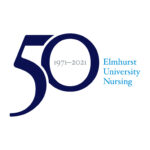Be a Leader in Health Care
Elmhurst’s online Doctor of Nursing Practice (DNP) program prepares you to manage complexity and lead change in health care and community systems—and improve population health.
Get an overview of Elmhurst’s Doctor of Nursing Practice from Program Director Becky Hulett and Department of Nursing and Health Sciences Chair Diane Salvador.
Take Your Nursing Practice to the Next Level
In today’s complex health care environment, you need an advanced degree that prepares you to lead.
Elmhurst’s DNP program takes a systems-level approach, teaching you the broad-based skills and perspective you need to make a difference across complex systems. You’ll be equipped to help make high-level policy changes that have a direct impact on patients, systems and communities.
Meanwhile, you will grow your leadership skills and increase your ability to create and sustain change.
Earn Your DNP Online
Our flexible DNP is specifically designed to accommodate the schedules of working nurses. The entire program is online, with a combination of synchronous and asynchronous classes. But distance learning doesn’t mean distant learning—you and your classmates will go through the program as a cohort, giving you a supportive community of study partners and colleagues.
The program also offers clinical hours integrated throughout the curriculum, making it easier to complete all of the clinical time required to earn your doctoral degree.
Program Format
- 100% online
- Part-time
- 7 semesters
- 28 months to complete
The Right People on Your Side
Our nursing faculty are not only scholars who have earned the highest possible degree in their fields, they’re also skilled experts in many areas of nursing practice—from administration and research to pediatrics and public health. And they take pride in creating genuine connections with students and giving you the one-on-one attention you deserve.
Elmhurst University gives a lot of strong support to our students. We’re passionate about making our students successful and helping them in any way that we can.”
Becky Hulett, DNP, R.N., CNL Program Director
Leverage a Legacy of Leadership
 Elmhurst has been leading the way in nursing education for 50 years. Today, U.S. News & World Report ranks our undergraduate and graduate nursing programs among the best in the nation, and our graduates have outstanding pass rates on national licensure exams.
Elmhurst has been leading the way in nursing education for 50 years. Today, U.S. News & World Report ranks our undergraduate and graduate nursing programs among the best in the nation, and our graduates have outstanding pass rates on national licensure exams.
Apply to the Program Today
Ready to begin? Start your application to the DNP program. Connect with our admission team if you have questions about the process.
